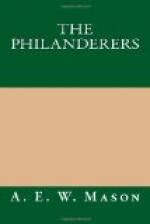Fielding recollected an answer he had made to Mallinson. The word ‘heart’ brought it to his mind. Mallinson was jeering at the journalist’s metaphor of the ‘throbbing heart’ as applied to London. ‘The phrase,’ Drake had said, ’to me is significant of something more than cheap phraseology. I know that half a throb could create an earthquake in Matanga.’ What if the man’s established interest in this direction were to suppress his nascent interest in Clarice! Fielding immediately asked Drake what he thought of Miss Le Mesurier.
‘Oh!’ said the latter, palpably waking from reflections of quite another order, ‘I liked her,’ and he spoke of her looks.
‘She has the art of dressing well,’ corrected Fielding, disappointment spurring him to provoke advocacy of the lady. Drake, however, was indifferent to the correction.
‘I like her eyes,’ he said.
‘She is skilled in the use of them.’
‘I didn’t notice that. They seemed of the quiet kind.’
‘At need she can swing a wrecker’s light behind them.’
‘I like her hand too. It has the grip of a friend.’
‘A friend! Yes. There’s the pitfall.’
Drake only laughed. He was not to be persuaded to any strenuous defence, and Fielding felt inclined to harbour a grudge against him as needlessly a spoil-sport. Later on, however, when he was in bed it occurred to him that the play might still be performed, though upon different lines, and with a plot rather different from what he had imagined—his plot inverted, in fact. Clarice Le Mesurier, he remembered, had made the first advance to Drake. What if she for once in a while were to figure as the pursuer! That alternative would, perhaps, be the more diverting of the two. He must consult Mrs. Willoughby as to the effect which Drake’s bearing would produce on women—consult her cautiously, prudence warned him. Mrs. Willoughby, a cousin and friend of Miss Le Mesurier’s, was not of the sort to lend a helping hand in the game if the girl was to provide the sport—or indeed in the other event. The one essential thing, however, was that there should be a comedy, and he must see to it that there was one, with which reflection he drew the bed-clothes comfortably about him and went to sleep.
There was, however, one other condition equally essential to his enjoyment, but so apparently inevitable that he did not stop to consider it, namely, that Hugh Fielding should be a mere spectator. It did not occur to him at all that he might be drawn into an unwilling assumption of a part in his own play.




